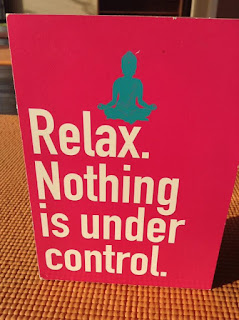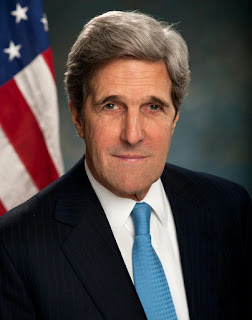 |
| On my last day at work in the Connacht Tribune. |
I had even taken a gap year in 2010 which opened me up to a whole new world. Diving in tropical waters off the coast of south-west Thailand or helping out at an educational project in Nicaragua provided wonderful experiences and rich spiritual rewards, but hardly offered the security and material comfort most human beings crave.
Our own history of famine, eviction, and emigration has given Irish people an understandable sense of anxiety about the need to forge out comfortable lifestyles – there are surely deep-rooted reasons for our obsession with the property market – and I found myself paralysed with fear as I stood at a crossroads in my life.
Three years ago, I wanted to run off and fight for social justice in a far-off corner of Central America. And yet I was gripped by a fear of leaving my family and friends behind. It’s amazing how scary freedom can be when it’s offered to you on a plate, as though life is somehow easier if you are chained to a 9 to 5 job and an all-too-familiar routine.
Three years on, I don’t claim to have all the answers or to have somehow, miraculously, found the meaning of life. And yet it has been a time of deep personal awakening which has forced me to re-evaluate what’s important in life.
Two weeks ago, I stood in Dublin at the Irish Blog of the Year awards and realised I had come so far without having a need to travel the world. I may not be making a fortune, but I feel I have learned so much.
Because too many of us can stay in unhappy or unrewarding situations for years or even decades, understandably so when there are mortgages to pay or children to feed, but it’s really sad when we let our lives by governed by a fear of change.
So here, for what it’s worth, are seven lessons learned since I took voluntary redundancy. Sometimes we don’t measure our lives for what they are really worth and winning second prize at the V by Very Irish Blog Awards is not really an important milestone in itself. But the award got me to ponder on what I’ve grasped since October 2014.
 |
| My V by Very blog award (Current Affairs) |
Dignity is so important: Often we, as human beings, can be harder on ourselves than anyone else could possibly imagine. My first visit to a Social Welfare office after more than 22 years of working was a huge blow to the ego. As I sat in a lengthy queue, waiting for my number to come up, I wanted the ground to swallow me up. I was judging myself a failure for every second of every day, when I suddenly found myself out of work. I learned a lot during that seven months, the pain of unemployment compounded by a ‘superbug’ I picked up in the local hospital.
It was amazing to see some members of staff treat people as less than human beings. After waiting maybe two hours to see someone, perhaps to report that I’d managed to get a couple of days’ freelance work, it was demoralising to be faced with a scornful civil servant who seemed to look down on everyone they met on the other side of the barrier.
There are no votes in complaining about the length of queues at dole offices, but it would be nice to think people might realise that there are real human beings behind the statistics. I met some lovely people sitting in those endless queues and was struck by how infrequently we hear their stories on the national airwaves. And, of course, dignity works both ways. It’s important to remember that the person on the other side of the window is a human being, too, even if some of them play the part of faceless bureaucrats far too well at times.
Friends and family are important: It’s a cliché, of course, but if you have a really busy life, as I had in the newspaper business, it can be very easy to take things – and especially people – for granted. In my wanderlust, in my desire for sunnier climes, I never really paid enough attention to the good things I already had in my life. The Irish story is very much one of heartbreak and emigration, but there are very good reasons for staying in your home town, village or city. Plus, teaching foreigners English on a part-time basis has given me a whole new appreciation for my city, when I view it through their eyes.
The people you grew up with are the people who will help you out most in your time of need, even if of course it can be great to take off on new adventures and meet a whole new circle of friends. I remember one call out of the blue, on a wet and windy January night, which really lifted my spirits at a time when I was really feeling blue and so uncertain about what was coming next in my life. That call was from somebody I have known all of my life.
 |
| So many people are struggling ... how often do we just walk by? |
Learn to accept: I have a friend, a yoga teacher, who has a sign inside his isolated rural cottage which proclaims “Relax: nothing is under control”. So many of us cause ourselves so much suffering by trying to control the people or events which occur in our lives. When a former work-mate let me down recently, I took his stab in the back too much to heart. When I didn’t get a particular job, I might mull on it for weeks. Acceptance is key to a happy life. We sometimes forget that we are all going to die and that we should just make the most of our time on this planet, rather than getting caught up in ego-driven disputes and dramas. It’s not what happens to us, but how we deal with events, that counts.
Don’t isolate yourself: Hours spent on Facebook are no substitute for a cup of tea and a chat shared with a good friend. The sudden blow of finding myself out of work was reduced when I would arrange to meet a friend to catch a movie or a football game. I soon realised that friends were going through, or had gone through, similar experiences to me, but perhaps I had not paid enough attention to them because I had such a busy life. A chat in the sauna in my local gym, at the end of a fruitless day job-hunting, might have meant an awful lot more to me than the person I was talking to realised.
 |
| "Life is so much wiser and kinder than your mind imagines" - Mooji |
So many people are struggling: When you take a huge cut in income, when you get out and have really meaningful conversations with people, you soon realise that so many people are struggling to make ends meet. You take a bus instead of a taxi and you find yourself deep in conversation with a person on the margins. You take a ‘zero hours’ contract job and marvel at the people bringing up families on tiny incomes.
You stop and chat to the homeless person on Shop Street and realise he is a real human being who has experienced real suffering and, there but for the grace of God, you could be in his exact situation if you had been thrown the same roll of the dice. I haven’t had a drink for almost a year and my city looks an awful lot different late at night when viewed through sober eyes.
Look after your mental health: Do whatever it takes to relax, treat yourself, and overcome those fearful, negative thoughts. For me, a meditation group gave real solace in the midst of a personal crisis. A weekly yoga class allows me to switch off, forget my problems, and perhaps have a giggle with some people I hardly know.
A swim in the pool or a walk on the Salthill promenade on a winter’s night is far better than lying on the couch, obsessing over what might have been or the uncertainty of what will come next in this crazy adventure called life. If you look after your body and your mind, the problems which seemed insurmountable a week or a month ago suddenly pale into insignificance and perhaps you can even learn to wake up with a smile on your face and to appreciate all the good things in your life.
‘Career’ is not everything: It takes courage, or perhaps madness, to say goodbye to a job or a career you have had for more than two decades. Even if that career is in terminal decline. But the happiest people I have met don’t drive BMWs, golf in the best clubs, or wear a shirt and tie to work. They may be teaching refugees English, helping out in a Direct Provision centre, or running educational projects in some of the poorest places on earth.
 |
| A great quote I disovered in the wilds of Connemara last year |
Some of the happiest people I’ve met are surviving on $2 a day in the poorest neighbourhoods of Nicaragua and it’s easy to forget that if you spend your life judging yourself, or comparing yourself to the people around you.
Life never was meant to be a competition or a race, but it’s easy to forget that when we get caught up in the “politics” of a particular career. It must be awful to spend your life rushing to get to the top of the ladder, only to realise you never wanted to climb that particular ladder in the first place!
Please check out my business website, if you would like to hire a blogger / content writer: http://ciarantierney.com/
Find Ciaran Tierney on Twitter, https://twitter.com/ciarantierney
Find Ciaran on Facebook: http://facebook.com/ciarantierneymedia







